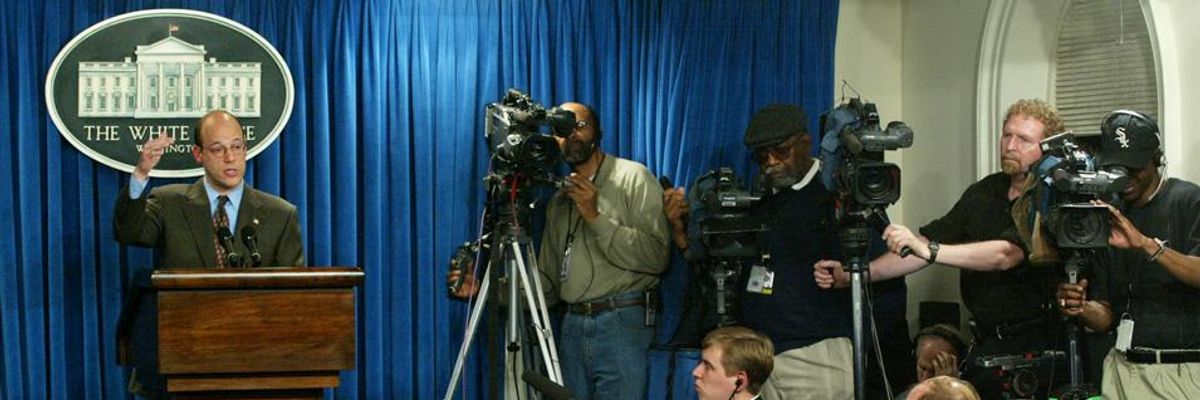

SUBSCRIBE TO OUR FREE NEWSLETTER
Daily news & progressive opinion—funded by the people, not the corporations—delivered straight to your inbox.
5
#000000
#FFFFFF
To donate by check, phone, or other method, see our More Ways to Give page.


Daily news & progressive opinion—funded by the people, not the corporations—delivered straight to your inbox.

White House Press Secretary Ari Fleischer gestures as he speaks to reporters at the White House briefing room April 2, 2003 in Washington, DC. (Photo by Alex Wong/Getty Images)
Russell Mokhiber questions White House Press Secretary Ari Fleischer (May 14)
Russell Mokhiber: Ari, you said on April 10th, about weapons of mass destruction, "That is what this war was about." On Sunday, The Washington Post reported that the group directing U.S. search efforts for weapons of mass destruction in Iraq is winding down operations without finding proof that Saddam Hussein kept clandestine stocks of outlawed arms.
Ari Fleischer: Efforts aren't winding down, efforts are cranking up. As Dr. Rice said in an exclusive interview with Reuters, we are sending in additional teams of people and increasing the amount of inspectors, the amount of people who go through documentation, people who are more expert, to continue to go in. And nothing has changed from what I said on April.
Mokhiber: If I could follow up on that. Let's -- hypothetically, these weapons are --
Ari Fleischer: You're beginning a sentence with the wrong word. (Laughter.) You just hurt your cause.
Mokhiber: If The Washington Post report is correct, and weapons that Secretary Powell said are there, are not there, I'm wondering if -- what are the chances that you were misled?
Ari Fleischer: No, I think that you've heard it from enough officials to know that you should not begin a sentence with a hypothetical. We remain confident in all the statements we've made about it.
Trump and Musk are on an unconstitutional rampage, aiming for virtually every corner of the federal government. These two right-wing billionaires are targeting nurses, scientists, teachers, daycare providers, judges, veterans, air traffic controllers, and nuclear safety inspectors. No one is safe. The food stamps program, Social Security, Medicare, and Medicaid are next. It’s an unprecedented disaster and a five-alarm fire, but there will be a reckoning. The people did not vote for this. The American people do not want this dystopian hellscape that hides behind claims of “efficiency.” Still, in reality, it is all a giveaway to corporate interests and the libertarian dreams of far-right oligarchs like Musk. Common Dreams is playing a vital role by reporting day and night on this orgy of corruption and greed, as well as what everyday people can do to organize and fight back. As a people-powered nonprofit news outlet, we cover issues the corporate media never will, but we can only continue with our readers’ support. |
Russell Mokhiber: Ari, you said on April 10th, about weapons of mass destruction, "That is what this war was about." On Sunday, The Washington Post reported that the group directing U.S. search efforts for weapons of mass destruction in Iraq is winding down operations without finding proof that Saddam Hussein kept clandestine stocks of outlawed arms.
Ari Fleischer: Efforts aren't winding down, efforts are cranking up. As Dr. Rice said in an exclusive interview with Reuters, we are sending in additional teams of people and increasing the amount of inspectors, the amount of people who go through documentation, people who are more expert, to continue to go in. And nothing has changed from what I said on April.
Mokhiber: If I could follow up on that. Let's -- hypothetically, these weapons are --
Ari Fleischer: You're beginning a sentence with the wrong word. (Laughter.) You just hurt your cause.
Mokhiber: If The Washington Post report is correct, and weapons that Secretary Powell said are there, are not there, I'm wondering if -- what are the chances that you were misled?
Ari Fleischer: No, I think that you've heard it from enough officials to know that you should not begin a sentence with a hypothetical. We remain confident in all the statements we've made about it.
Russell Mokhiber: Ari, you said on April 10th, about weapons of mass destruction, "That is what this war was about." On Sunday, The Washington Post reported that the group directing U.S. search efforts for weapons of mass destruction in Iraq is winding down operations without finding proof that Saddam Hussein kept clandestine stocks of outlawed arms.
Ari Fleischer: Efforts aren't winding down, efforts are cranking up. As Dr. Rice said in an exclusive interview with Reuters, we are sending in additional teams of people and increasing the amount of inspectors, the amount of people who go through documentation, people who are more expert, to continue to go in. And nothing has changed from what I said on April.
Mokhiber: If I could follow up on that. Let's -- hypothetically, these weapons are --
Ari Fleischer: You're beginning a sentence with the wrong word. (Laughter.) You just hurt your cause.
Mokhiber: If The Washington Post report is correct, and weapons that Secretary Powell said are there, are not there, I'm wondering if -- what are the chances that you were misled?
Ari Fleischer: No, I think that you've heard it from enough officials to know that you should not begin a sentence with a hypothetical. We remain confident in all the statements we've made about it.